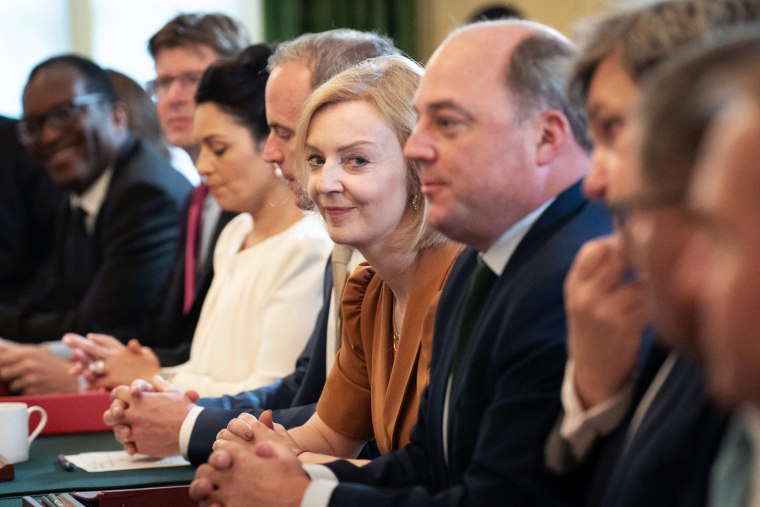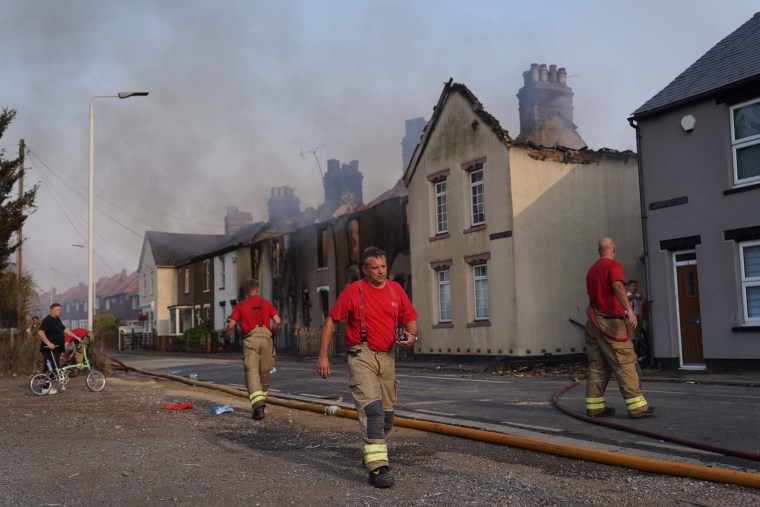LONDON — Britain is currently a land of two parallel universes.
In one, the country has been plunged into two days of brutal, extreme heat, smashing 360-year-old temperature records, sparking unprecedented wildfires and bringing daily life for many to a stultifying halt.
In the other universe is the Conservative Party leadership contest — a realm where global warming is barely mentioned at all.
The winner automatically becomes prime minister, following Boris Johnson’s scandal-prompted resignation this month, and will likely guide environmental policy for the world’s sixth-largest economy for years.
Right now those vying to become prime minister are accused of ignoring climate change and this week's heat wave. In a vote Wednesday, the Conservative Party chose Rishi Sunak and Liz Truss as its two finalists, eliminating Penny Mordaunt.
It’s “a leadership contest that’s out of touch with reality,” said Tim Bale, a politics professor at Queen Mary University of London, who rates some of the candidates’ promises on tax cuts as equally fantastical. “They just don’t want to talk about it because, inevitably, it’s going to involve some sacrifices and disruption for people.”

The reason for this green equivocation isn't necessarily ideological but rather more likely electioneering, Bale and other experts say.
Climate science denial is rare in mainstream British politics. And the remaining leadership candidates — Sunak and Truss — have all committed to keeping Britain's target of net-zero carbon emissions by 2050, the same as Washington's.
But like many in the right-of-center party, they have worried aloud about the supposed economic risks of being seen as too gung-ho on environmentalism. And that's in the rare moments they have discussed it at all.
“If we go too hard and too fast” toward net zero “then we will lose people,” Sunak, the current front-runner, warned during an ITV News debate this week. Truss said she wanted to find better ways to achieve the goal that don't “harm people and businesses.”
These candidates know that mainstream British voters really do worry about the environment, with only the economy and health care considered more important issues by the general public, according to a weekly survey by pollster YouGov.
Unfortunately for the vast majority of the United Kingdom’s 48 million registered voters, they have no say in choosing their next leader. The winner will instead be selected by the 350-odd lawmakers and 200,000 members of the ruling Conservative Party.
That’s less than 0.3% of the population, a tiny subset that skews way to the right of the British political center. Conservative members are 97% white — around 10% higher than the rest of the U.K. — and they tend to be richer, older men living in the affluent southeast.
Few prioritize reducing carbon emissions, with just 4 percent deeming net zero the most important task for their incoming leader, another YouGov poll found this week. The highest priority was simply beating the opposition Labour Party at the next election, the poll conducted for Britain’s The Times newspaper said.
Many economists, climate scientists and activists say this is a false dichotomy between climate and economy: If there's anything wrecking the economy, it's the too-slow progress on stemming the climate crisis.
That reality came crashing into the foreground for Britain this week as it broke its temperature record, topping 104 degrees Fahrenheit Tuesday, making it hotter than 98% of the planet.
Much of this typically mild archipelago with scant air conditioning was brought to a standstill. The government advised people to stay indoors and millions drew their curtains in a fruitless attempt to keep the heat out. Many live in brick, terraced houses built in the 1800s that are designed to stay warm, not cool.

Wildfires raged across the country — unprecedented at this scale here — including one particularly ferocious blaze that ripped through dozens of homes in east London. The city's firefighters had their busiest night since World War II, Mayor Sadiq Khan said.
Against this apocalyptic backdrop, the Conservative candidates "completely misunderstand how we go about solving the climate crisis," said Josh Bloodworth, 23, a climate activist at the U.K. Youth Climate Coalition, a volunteer group. "Lots of solutions to the climate crisis are also solutions to economic problems."
NBC News has reached out to all three campaign teams for response to these criticisms.
The reality is whoever wins will likely keep the current Conservative government’s path of “committing to the ends without really being as serious as they should be about the means,” Bale said.
Britain’s policies are not quite sufficient to keep global warming below 2 degrees Celsius (35.6 degree F) this century, according to the Climate Action Tracker, an authoritative nonprofit database in Germany.
The U.K. “talks a big game” when it comes to environmentalism, as Bale puts it, hosting the COP26 summit in Glasgow, Scotland, last year and urging China and others to do more. “But it’s very difficult to see how on the present trajectory it’s going to get us there.”
